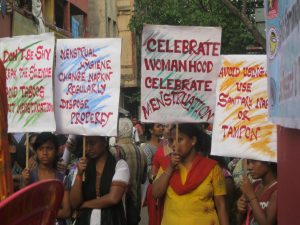By Shamila Ghyas
(This is a cross-post from The Nation )
Recently, students at Beaconhouse National University in Lahore protested against the stigmatisation of the ‘M word that should not be mentioned’ because it is supposedly every female’s dirty little secret. They used shock value to get their message across by sticking sanitary pads on a wall – each with a different message:
“I am not flawed or poorly made”
“Don’t hide me”
Some girls even walked around with stains on their shirts. One thing that everyone needs to understand is that this does not mean they are saying women should walk around bleeding everywhere. It’s quite simple — accidents can happen and a female should not be shamed for it. It should be regarded the same way as a ketchup stain on anyone’s clothes. There should be no tears of embarrassment. It should not be a big deal.
But apparently it is a big deal; wars can break out on Facebook because of it, with major newspapers rushing to ‘cover’ it everywhere. There is hush about the M word but the fight it caused is everywhere. Putting all that aside, is this really that important an issue? Women for centuries have dealt with it with no problems. Or have they?
In some societies, the M word is associated as being unclean. Some church fathers do not want women ministers because of this very notion. In many households in the Subcontinent – especially India as the kitchen is considered a pure, even sacred, zone – the ‘6-days-every-month-untouchable’ women are not allowed to enter it. They can’t even go in to butter a simple toast.
Apparently, the food they prepare or handle can get contaminated. According to a study by Kumar and Srivastavain 2011, through very ‘rigorous science-ing’ methods, they found that during that time of the month, the body emits some specific smell or ray which turns preserved food bad. So sour foods like pickles, tamarinds and curd are a definite no. They also believe eating these foods will stop the flow.
In Judaism:
“In the Torah (Leviticus 15:19-30), a menstruating woman is considered ritually unclean – “anyone who touches her will be unclean until evening” (New International Version). Touching her, touching an object she had sat or lain on, or having intercourse with her also makes a person ritually unclean.“
(Source: Wikipedia)
As they are considered dirty and impure, all places of worship become no-fly zones. If you do enter and someone finds out, you will be hit with God’s hell fire missiles.
Some of other bizarre rules include (from various countries):
· She should not bathe
· Sleep during the daytime
· Wear flowers
· Ride a horse, ox or elephant (because all three are always just sitting around waiting for women)
· Have sex
· Touch other people
· Talk loudly
· Exercise
· Even ride a car
· If you throw a pad with other garbage it cancause cancer (this gem comes from Bolivia)
· No salt (Zambian geniuses)
In Suriname, (South America) it is believed that the blood can be used for black magic called ‘Wisi.’ The cloths, which the women use, are usually buried so the evil spirits can’t use them. They also think the blood is so dangerous that a woman can use it to have her way with men (That’s definitely not the love potions we heard about).
There also exists the Chaupadi Tradition (outlawed but still in practice) in the rural villages of Nepal, where women are usually sent to live in a shed in isolation for a week until their time of “shame” and “impurity” is over. The word unclean is thrown about so freely by people, I do wonder if they worry just as much when they shake hands with people who don’t wash them after going to the bathroom (Next time you shake someone’s hand, think about that).
Ever seen a female Sushi chef in Japan? There are virtually none. They believe that when “the M word that must not be mentioned” is happening, women’s tastes becomes unbalanced. So this job is left to the man with the oh-so-steady taste.
Women have cramps, painful backs, endometriosis, dysmenorrhea, the constant nagging anxiety that something might leak, exhaustion, hot flashes, cold sweats and if that wasn’t enough, then the added taboos. Do women really need it?
What does all this amount to? According to Unicef, 1 in 10 women in Africa miss schools during the M period. This obviously leads to a higher drop out rate and the girls don’t learn to their full potential.
In Bangladesh 73% of female factory workers are not paid for six days every month because they don’t come in to work during that time. Almost 50 per cent of Pakistani girls in rural areas and underprivileged circumstances miss school during their time of the month as well.
For the poor, sanitary napkins are a luxury and they make do with cloths, which are used, washed, then reused again. And when not disinfected properly, they can lead to various infections that may eventually cause issues related to infertility.
In India, only about 12% of women have access to sanitary pads and in Pakistan they are taxed as a ‘luxury item’. Taxed and quickly hidden inside a brown paper bag so no one can see it and bought with virtually no eye contact. Ironically, the brown paper bag makes it even more obvious that someone in the buyer’s household is about to hit the “unclean” time of the month. Someone clearly did not think this through.
Let’s just pretend that it doesn’t exist. Which is what most of the people do anyway. They don’t talk about it, don’t mention it, and pretend it doesn’t exist. It’s all hush hush as if talking about some grave sin. The “M” word is really not that hard to say. Nothing will happen to you or anyone else who says it. Let’s try it here and see if our respective laptops burn down.
Menstruation!
See, nothing happened.
It is a natural process of the female body. There is nothing wrong with it, and should not be treated like a disease. It should not cause shame. Men need not cringe every time they hear the word menstruation and women don’t need to hide or be shunned. It’s not a dirty little secret.
And once we cross that, it will spill over and we can finally get rid of the orthodox customs, increase education regarding it, and the rampant misconceptions will die a much needed death.
Shamila Ghyas is a Pakistani fantasy fiction author and journalist who writes for various publications. Her main focus is on rights of women and minorities. Nutella-holic, music obsessed, and Superman’s alter ego. Find her on Facebook and follow her on Twitter.


